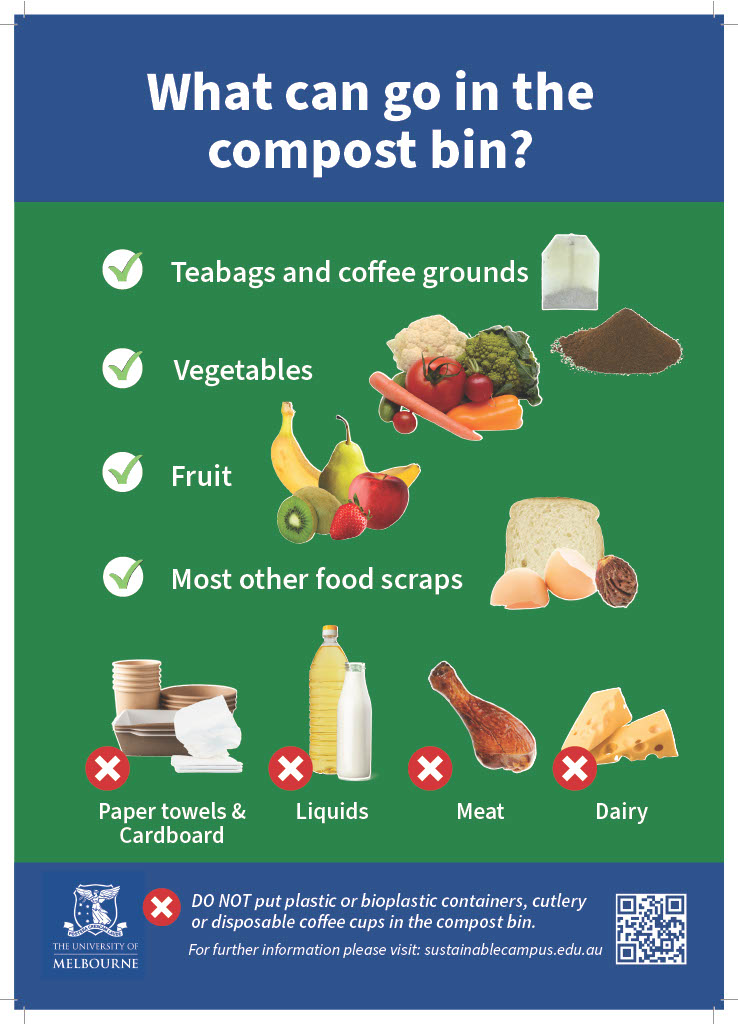Food organics
Turn your food scraps into a nutrient-rich resource by using an organics or compost bin on campus.
Food waste accounts for 17% of our waste at the University as determined by the 2019 Parkville waste audit. There are many ways to divert your food and organic waste from going to landfill and help to reduce the amount of methane produced from rotting food.
Scrape your plate at the Student Precinct
Scrape your plate next time you eat at any retailer in the Student Precinct (Parkville campus). After your meal, dispose of unwanted food scraps organics bins located at every Choose to Reuse drop-off station. Our cleaning team will collect all organics waste to be processed off campus. This service runs as part of the Choose to Reuse Plate Program.
What to put in
- Any food scraps (including bones and liquids)
What to leave out
Anything that is not food. This includes:
- Bamboo or wooden cutlery
- Serviettes or paper
- Bioplastics
- Biodegradable packaging including Biopak branded containers
Where do the food scraps go?
While the contents of the organics bins are collected to be processed off campus, all back of house organic waste is handled onsite using the food waste processor. This machines mixes, heats and adds microbes to the food organics for up to a week. The process turns the organic material into soil conditioner which is then taken offsite to be matured and mixed to make nutrient-rich soil.

Composting
Compost bins are available on campus for you to dispose of your food and organic waste. These bins are available at Parkville, Burnley, Shepparton and Werribee. There may already be a compost bin set up in your building. If there is not you can start a composting group in your office and be supported by the University by joining Green Impact.
Compost at the Community Garden
Whether you want to take the scenic route to class or have lunch in some beautiful greenery, the Melbourne University Community Garden (Parkville campus) have compost bins available for you to throw away your food scraps. Make sure to read the signs to ensure you are composting right.


Compost at the System Garden
The System Garden compost bins are located between Babel building and Biosciences 2, at the System Garden Professors Walk entrance. The compost bins are Sub Pods, in which you can dispose most organic material.
What to put in
- fruits and vegetables
- nuts and seeds
- bread, pasta, cereal and rice
- loose tea and coffee grounds
- paper towels
What to leave out
- meat, fish and bones
- dairy products
- liquids
- tea bags and coffee pods
- food packaging (compostable and non-compostable)
Make sure you follow the instructions when adding your food scraps to ensure we create a nutrient-rich resource.
How to add to the compost bins
- Open the brown compost bin lid.
- Remove the worm blanket.
- Add your food waste.
- Add a handful of lawn clippings from the holding bin.
- Turn with the soil with the aerator.
- Put the worm blanket back in place.
- Close the lid.
All About Organics Tour
If you're keen to find out more about about composting and organic waste processing on campus and get involved, keep an eye on the Sustainability Team Instagram for future All About Organics Tour dates. On this tour, you'll see the Food Waste Processor on campus, and you’ll learn how to use the compost bins in the System Garden and in the Community Garden.